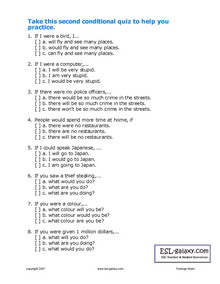

We wouldn't have had to pay late fee if you had paid the bill on time. If you had paid the bill on time, We wouldn't have had to pay late fee. These events were in the past and with third conditional we talk about what would have happened if the events had happened differently or if they hadn't happened.Īs in the first and second conditional, the if clause and the main clause can be swapped. They would have heard the news if they had listened to the radio. Newton had had a driving licence, he would have got the job easily.ĭ. There are five ways to make conditional sentences in English: Zero Conditional. Conditional sentences are made up of a dependent clause and an independent clause joined to express said condition. If I hadn't complained, I wouldn't have got my money back.Ĭ. A conditional sentence is a type of sentence that states a condition and the outcome of that condition occurring. There are four types of conditionals in the English language: first conditional, second conditional, third conditional and zero conditional. Thompson had worn his raincoat, he wouldn't have caught a cold.ī. Conditionals Learn conditional definition with examples. If + Subject + Past Perfect Tense + Subject 2 + would / could / should / might + have + V3Ī. The weather was not nice, we couldn't/didn't barbecue. If I had been rich, she would have come with me last July. If I (see) him, I'll give him the message. If the weather had been nice yesterday, I would have barbecued. Decide whether the following sentences should be in the first or second conditional and put the verb in brackets into the appropriate form: check reset answers. The condition statement was unreal in the past, the condition was not met and the dependent did not happen.

One can also think of it as the imaginary case. If Clauses Quizzes Third conditional if, also known as type three conditional, is used for unreal situations in the past. 1 prenos preberite na spletu brezplano, Intermediate grammar exercise: first vs.


 0 kommentar(er)
0 kommentar(er)
